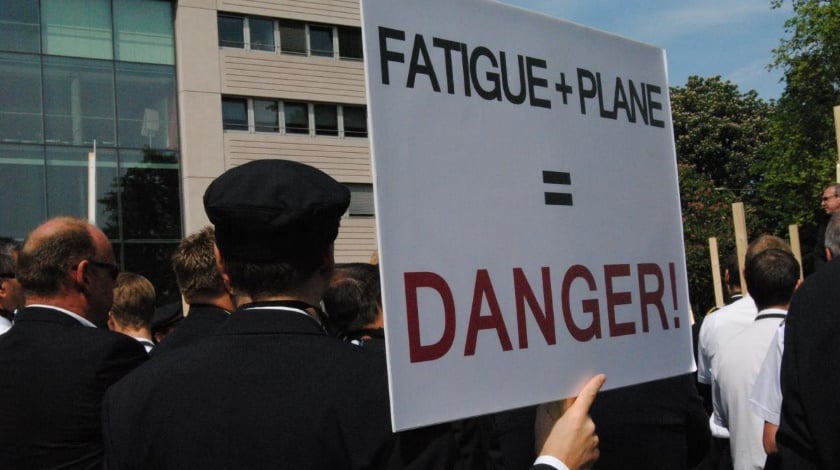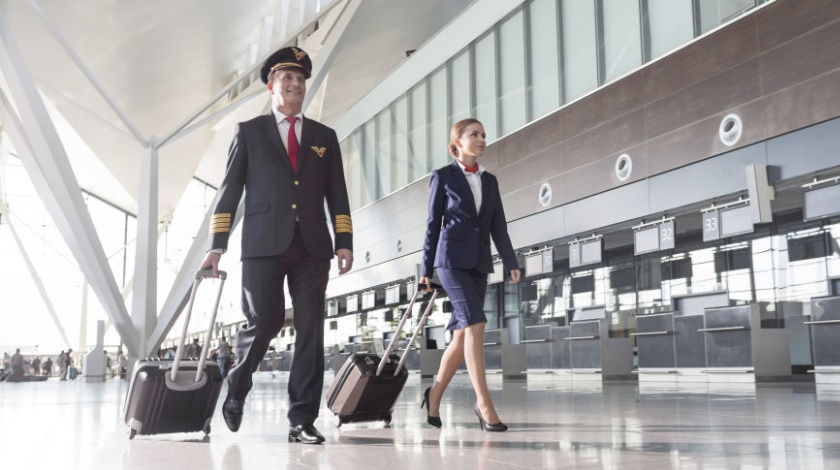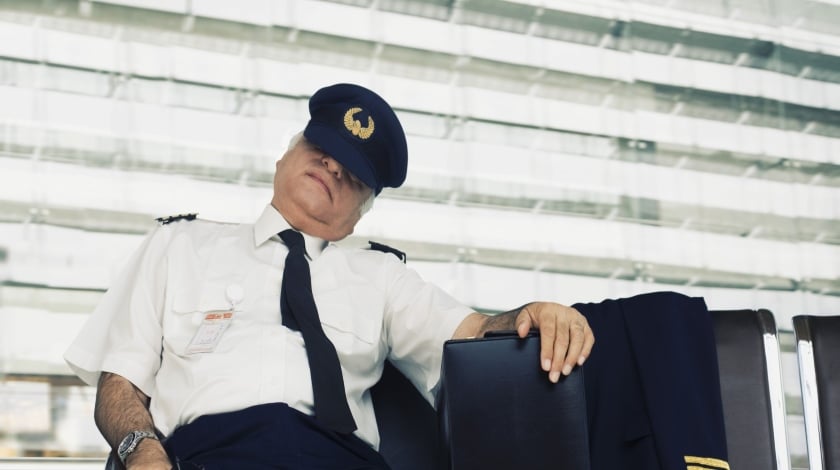Photo: stathis.michail.gr
Reading Time: 6 minutesIt is perfectly normal for people to become tired. Nearly everyone experiences fatigue, however, some professions, such as aviation, medicine or the military, demand precise, rapid and well-informed decision making as well as communication with little margin for error.
Concern about the potential for fatigue to negatively affect human performance in the aviation context extends back decades, with both airlines and pilots agreeing that fatigue is an issue posing a very troubling threat to millions of passengers as well as valuable cargo supplies that are carried by various means of air transport each day.
Obviously, this is an acceptable risk which cannot be fully excluded; however, this problem is not given enough credits. Exhaustion in the cockpit can be deadly as seen in 2009 when an American commuter plane crashed killing everyone on board. That accident was blamed in part on fatigue.
Another example might be 16 passengers on an Air Canada flight that were injured as a result of pilot fatigue. The co-pilot woke disorientated from a nap and, believing that the plane was going to collide with another aircraft, put the jet into a dive, sending passengers sprawling in the cabin. What the pilot thought was another plane was actually the planet Venus.
In light of possible fatal outcomes, aviation authorities are actively discussing pilot fatigue-related concerns and are putting dozens of efforts to resolve this problem and minimize all the potential risks.

Quality Sleep The Only Effective Fatigue Countermeasure
ICAO defines fatigue as “a physiological state of reduced mental or physical performance capability resulting from sleep loss or extended wakefulness, circadian phase, or workload (mental and/or physical activity) that can impair a crewmember’s alertness and ability to safely operate an aircraft or perform safety-related duties”.
So, no doubts that primarily the pilot fatigue problem comes out of the lack of quality sleep which is the only effective fatigue countermeasure. Whilst muscles can recover with rest, the brain can only recover with sleep.
An average adult person needs between 6 and 8 hours of sleep per day to sustain optimal performance. In turn, the quality of sleep depends on the structure and continuity of sleep. The quality of sleep depends, amongst other factors, on the time of the day.
Professor Torbjorn Akerstedt, a sleep expert based at Karolinska University in Sweden, said that most people are able to stay alert for 16 hours during the daytime, but that reduces at night. It has been well established scientifically, Mr Akerstedt said, that the impairments a pilot experiences landing a plane at 05:00 in the morning are the equivalent of having a blood alcohol level of 0.08%.
For example, pilots who fly on long-haul routes or operate planes at night have to fight with body’s natural internal clock which reminds a person that this time his body needs relax. The imbalance of the body’s natural circadian rhythm makes a pilot feel tired. This is especially true for those pilots that have varying schedules or alternate day and night shifts.
Actually, a lot of reasonable insights regarding pilot fatigue issue were provided by a famous pilot, Charles Lindbergh. He managed to fly from New York to Paris without falling asleep. During his record-breaking 33.5 hours transatlantic flight he hardly fought to stay awake and later wrote in his journal that “nothing life can attain, is quite so desirable as sleep”.
Is The Lack Of Quality Sleep The Only Reason Behind Pilot Fatigue?
The lack of sleep is the main cause of fatigue, but not the only one. A bomb scare at 30 000ft, bird strikes, drunken passengers, medical emergencies, or simply a handbrake forgotten to disengage during take-off might contribute to general pilot’s condition as well.
Moreover, besides the accumulation of duty hours, cumulative fatigue can be caused by such factors as disruptive schedules (for example, starting early in the morning or ending late in the evening), extensive time zone crossings or combinations of rotations (for example, flying first to the east and then to the west or vice-versa).
One more reason is long commuting. A recent survey of European pilots found that more than half of those interviewed commute to work. These pilots are forced to start their work day 2-3 hours earlier than others to get to work on time.
Sometimes this happens due to the fact that a pilot lives far from the airport. However, more frequently this problem appears because a pilot lives at a totally different base and must fly from a different airport which are located far from each other and add hours to the beginning of a pilot’s working day.
Consequently, even a pilot who slept enough to perform his duties might get exhausted even before his job begins. According to a transportation safety watchdog, the commuting issue is “one that everyone wants to turn their head away from” pilots included.
Also, jet-lag is considered a huge problem impacting pilot fatigue on long-haul flights. Most operators give ample time for pilots to adjust to jet lag, but the body does go through stress when its circadian rhythm is interrupted, making it hard for pilots to sleep when they need to, and difficult for them to stay awake later when they have to.
Additionally, pilots that fly the same aircraft on the same routes into the same airports daily are prone to boredom fatigue. Nevertheless, it important to keep in mind that every pilot is a human that apart from his job deals with different problems that occur in his personal life. These psychological matters also greatly impact a pilot while carrying his duty in the cockpit.
Therefore, in the result of exhaustion pilots become affected both personally and generally. They lose their motivation to work, perform their duties carelessly without paying the necessary amount of attention. Also their decision-making skills diminish, especially this one is important for decisions that must be made rapidly.
However, the most important outcome of pilot fatigue is an aircraft accident and potential fatalities.

Aviation Authorities Taking Actions To Prevent Fatalities
In February 2016 new controversial European Aviation Safety Agency (EASA) flight time limitation laws came in to force. Now, almost a year has passed since European airlines started flying under new fatigue management rules which place stricter limits on when pilots fly, how much they fly and how much rest they get in between.
The Agency undertook an extensive and in its depth unprecedented consultation process, which included the assessment of a large amount of information and comments with the assistance of a group of industry experts and scientists.
It reflected the findings of all relevant publicly available scientific studies and proposed many key measures to mitigate the risks arising from major factors affecting human fatigue. Sleep loss, extended wakefulness, circadian phase, workload and the cumulative effects of fatigue were managed by a combination of limitations to flight time, flight duty periods, duty periods.
However, pilots fear these changes are made to force pilots work even longer and harder leading to dangerous levels of fatigue. Pilot unions still argue that the proposals do not go far enough and put passengers in danger.
Do Pilots Exaggerate The Level Of Their Exhaustion?
Of course, pilot fatigue related discussions make people sympathize with aviators complaints. However, Forbs notes that there are several reasons to remain skeptical about such claims.
Recently a large number of surveys were conducted to find out pilots’ assumptions regarding this problem. Accordingly, the results made it obvious that many pilots are bad at judging how fatigued they are. Automatically, this raises questions about the validity of their claims.
However, there is no need to blame pilots. Humans generally fare badly when questioned about their health. One group of scientists has found that the more tired people get, the less tired they feel.
Legislating tiredness out of the workplace is another matter. As the BBC’s David Robson notes, “cities (and technological devices) are always buzzing with life, and this ‘24/7’ culture can make it difficult to rest at any hour of the day or night.” After juggling spouses, children, exercise and chores, the real surprise would be that pilots – and indeed workers in general – are not tired when they show up at the office.
Responsibility Lies on Pilots’ Shoulders
Aviation accidents are still extremely rare, but when they have occurred, figures show that 80% are a result of human error, with pilot fatigue accounting for 15-20% of human error in fatal accidents.
Thus, fatigue is a very real problem for flight crews. While aviation authorities can help mitigate the risks of pilot fatigue through education, changes to flight hour limitations and other fatigue management programmes, the ultimate responsibility of fatigue management lies with pilots themselves.

